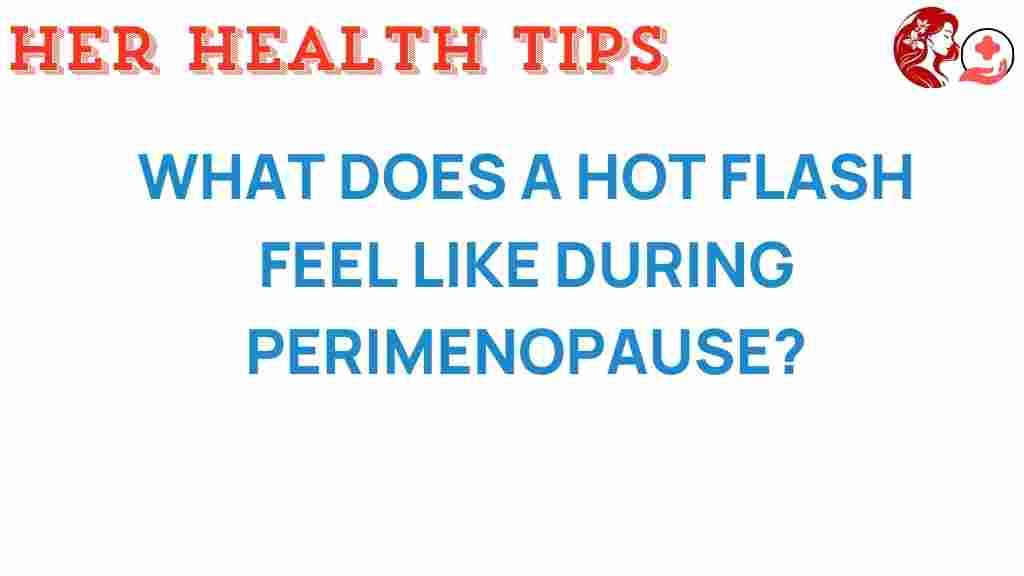The Surprising Sensations of Hot Flashes During Perimenopause
Hot flashes are one of the most common symptoms associated with perimenopause, a transitional phase before menopause that can bring about a variety of hormonal changes. For many women, these sensations can be surprising, uncomfortable, and even distressing. Understanding the causes, symptoms, and coping strategies for managing hot flashes is crucial for maintaining women’s health during this time. In this article, we will delve into the sensations of hot flashes, their impact on daily life, and effective methods to cope with these changes.
Understanding Perimenopause and Hot Flashes
Perimenopause is the period leading up to menopause, typically occurring in women in their 40s but can start earlier. During this phase, the body undergoes significant hormonal changes as estrogen levels fluctuate. These fluctuations can lead to a variety of symptoms, with hot flashes being one of the most prominent.
What Are Hot Flashes?
Hot flashes are sudden feelings of warmth that spread over the body, often accompanied by sweating and a rapid heartbeat. They can last from a few seconds to several minutes and can occur at any time, day or night. The sensations can be both physical and emotional, causing discomfort and anxiety.
Common Symptoms of Hot Flashes
Hot flashes can manifest in several ways, including:
- Intense Heat: A sudden rush of heat, often starting in the chest or face.
- Excessive Sweating: Profuse sweating that may soak clothing.
- Chills: Following the flush, many women experience chills as their body temperature drops.
- Heart Palpitations: A racing heart that can accompany the flash.
- Emotional Changes: Feelings of anxiety or irritability during or after a hot flash.
Why Do Hot Flashes Occur?
The primary cause of hot flashes during perimenopause is hormonal changes in the body. As estrogen levels decline, the hypothalamus, which regulates body temperature, may become more sensitive to slight changes in temperature. This can trigger the body to react as if it is overheating, leading to the sensations associated with hot flashes.
The Emotional Impact of Hot Flashes
Beyond the physical discomfort, hot flashes can also have a profound emotional impact on women’s health. The unpredictability of hot flashes can lead to:
- Anxiety: Worrying about when the next hot flash will occur can create a cycle of anxiety.
- Embarrassment: Experiencing a hot flash in public can be socially uncomfortable.
- Stress: The physical discomfort often leads to increased stress levels.
- Sleep Disturbances: Night sweats can disrupt sleep, leading to fatigue and irritability.
Coping Strategies for Hot Flashes
While hot flashes can be distressing, there are several effective coping strategies that can help manage symptoms:
1. Lifestyle Modifications
Making changes to your daily routine can significantly reduce the frequency and severity of hot flashes:
- Avoid Triggers: Identify and avoid triggers such as spicy foods, caffeine, and alcohol.
- Dress in Layers: Wearing layers can help you adjust to temperature changes throughout the day.
- Stay Hydrated: Drink plenty of water to help regulate body temperature.
2. Dietary Changes
Diet plays a crucial role in managing hot flashes:
- Incorporate Phytoestrogens: Foods like soy, flaxseeds, and lentils contain natural compounds that may help balance hormones.
- Eat Regular Meals: Keeping blood sugar stable can help reduce the frequency of hot flashes.
3. Exercise Regularly
Regular physical activity can help alleviate hot flashes and improve emotional well-being:
- Cardiovascular Exercise: Activities like walking, swimming, or cycling can enhance overall health.
- Yoga and Meditation: These practices can reduce stress and promote relaxation.
4. Alternative Therapies
Some women find relief through alternative therapies:
- Acupuncture: This ancient practice may help reduce the frequency of hot flashes.
- Herbal Remedies: Herbal supplements such as black cohosh or evening primrose oil may provide some relief, but consult with a healthcare provider before starting any new supplements.
5. Medical Treatments
If hot flashes are severe and significantly impact your quality of life, consider discussing medical treatment options with your healthcare provider:
- Hormone Replacement Therapy (HRT): This treatment can alleviate many symptoms of perimenopause, including hot flashes, but it is not suitable for everyone.
- Non-Hormonal Medications: Certain antidepressants and medications like gabapentin may also help reduce hot flashes.
Troubleshooting Tips for Hot Flashes
If you find that your coping strategies are not effective, consider the following troubleshooting tips:
- Keep a Hot Flash Diary: Track when your hot flashes occur and any potential triggers to identify patterns.
- Consult a Specialist: If hot flashes persist, consider consulting a menopause specialist who can provide tailored advice and treatment options.
- Connect with Support Groups: Sharing experiences with other women going through similar challenges can provide emotional support and practical tips.
Conclusion
Hot flashes during perimenopause are a common symptom that can significantly impact women’s health. By understanding the hormonal changes that lead to these sensations and utilizing effective coping strategies, women can manage their discomfort more effectively. Whether through lifestyle changes, dietary adjustments, exercise, or medical treatments, it is possible to alleviate the symptoms of hot flashes. Remember that you are not alone in this journey, and seeking support and guidance can make a significant difference.
For more information on managing the symptoms of perimenopause, check out this comprehensive guide on women’s health. If you’re looking for alternative therapies, consider exploring options through this resource on natural remedies.
This article is in the category Reproductive and created by HerHealthTips Team

1 thought on “The Surprising Sensations of Hot Flashes During Perimenopause”